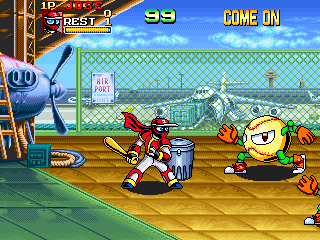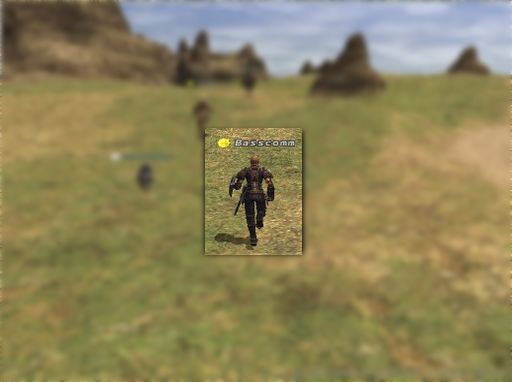Some time ago, I posted an interview that I did with myself. Now, nearly 5 years later, I was approached for a second interview, one that not conducted by me, for an academic paper. This was done by the wife of the legendary artist who brought us three unforgettable comics (refreshers here, here,and here).
It should be noted that this interview was conducted on the spur of the moment over IM while I was working at my ‘real job’ and I didn’t really have time to prepare, so some of the info may be a little rough around the edges, but I like it that way. Keeps things ‘real’. It also made me think about games in ways that I hadn’t before, which is always refreshing.
This is also the second academic paper that I’ve posted (the first one is here). I feel so… collegiate.
I did not grow up playing video games, but I married a man who did. He and his friends play lots of video games, and it is the primary activity and subject of discussion when they get together. Among his friends, I am the only wife who doesn’t play video games. Almost all I know about them is the names of some of the more famous mainstream ones. My informant is my husband’s friend William Morris, who is in his mid / late 20’s and has played video games for most of his life. He has also worked in the video game industry, attended industry conventions where new products and concepts are introduced, and keeps up on the latest developments; he therefore brings more than the usual level of expertise and credibility to the subject. I interviewed him on 07-7-28 via “instant message,” which conveniently constituted a transcript of the conversation, even as it was ongoing. This paper includes a list of questions and a brief essay. Please also find attached a chart.
The following is a list of questions I asked. Some of them are a little opaque out of context; I was responding to information that Will had given me.
1. How many kinds of video games are there, or what is the first basic division?
2. Okay, so four divisions to video games? (answer = no)
3. Does the RPG category break down into smaller categories? And also, can you define RPG?
4. What does MMORPG stand for?
5. Are there categories of single-player RPG?
6. Is there more than one kind of MMORPG?
7. Adventure games: Are there different categories of that category? And how would you define it?
8. So is adventure game a subset of RPG?
9. And action game is its own sort of category, but with no further division?
10. Okay, so Puzzle games: What are they, and what kinds of puzzle games are there?
11. So, would it be fair to say that “sorting” and “other” are the kinds of puzzle games? (answer = no)
12. With the puzzle games, are there different kinds of sorting, different kinds of matching, different kinds of logic, etc?
13. Are there different kinds of FPS?
14. Do you consider the online ones different from the not-online ones?
15. Strategy Games: What are they, and are there different kinds?
16. Okay, so you’re trying to out-plan the computer or the opponent?
17. Are there different kinds of strategy games? Or is war basically the only context for them?
18. Okay, so there’s “big picture” and “tactical strategy”?
(Will comments that strategy games may also be described as “turn-based” or “time-based”)
19. What are those?
20. So, are time and turn categories of big picture and tactical, or are big picture and tactical categories of turn and time?
21. Rhythm game: Are these like DDR and Guitar Hero? How would you define them?
22. So are there categories of rhythm games?
23. So, they vary by which controller you use, whether a dance pad, a guitar, or bongos, etc.?
24. Okay, now god games, what are those?
25. Is there more than one kind of those, or do you perceive them all as being basically the same thing?
26. Alright, another category you gave is “anything that’s a little silly.” (Will then elaborated on his earlier statement)
Will listed, in all, nine categories of video game. The ninth category “Anything that’s a little silly,” is sort of a catch-all; it may contain various elements of the other categories. I was also notified that since video games are still a relatively young media, they have not been subjected to much clear definition; Will felt that at times the lines between varieties were a little fuzzy.
The first (and most elaborate) category of video game is the RPG, or “Role-Playing Game.” This is any kind of game in which the player assumes the role of a character and moves him / her through a story. The traditional RPG is focused on the person of the character or characters. There is a subset of RPG called the “Adventure Game.” This kind of RPG focuses less on the character and more on the story. There are two kinds of RPG, those with a single player and the MMORPG, “Massively Multiplayer Online Role Playing Game.” These are games in which many people connect via the internet to a game. This game occurs in one virtual “persistent world,” a world which always exists, whether the player is there or not. The players can interact and have adventures together. A well-known example of this is World of Warcraft, with nine million players worldwide, as of July 24, 2007. MMORPGs may be subdivided based on their location; some occur in a fantasy world, some occur in a medieval sort of world, and some occur in a futuristic world. There are also MMORPG’s that focus on some sort of activity, such as driving game MMORPG’s, and First-Person Shooter MMORPG’s; First-Person Shooter is also a major video game category, and will be discussed below.
Another category of video game is the Action Game. This is a catch-all category for games in which, as Will says, “stuff happens.” However, the “stuff” that happens may not amount to a story. Any game which does not fit neatly into the other eight categories and is reasonably fast-paced could be categorized as an Adventure Game.
Puzzle games, in contrast to other kinds of games, favor reasoning skills rather than reflexes and memory. There are logic-based puzzles, as well as sorting puzzles and matching puzzles. A commonly-known sorting puzzle game is Tetris. In sorting puzzles, the player has a supply of things that he must arrange in specific ways, under a “constraint,” something that makes the task difficult (as in Tetris, wherein the pieces keep falling from above). In matching games, the player must arrange pieces on the board for some kind of effect. The category of “logic game” covers all other puzzle games that are not matching or sorting. Many puzzle games incorporate all three, and so may be called hybrids.
First-Person Shooter, or “FPS,” is a style of game in which everything is viewed through the character’s eyes. One never sees oneself. The basic idea of these games is that the player is “running around shooting things” (usually enemy combatants, like Nazis or terrorists). Some games that are also viewed in this manner use swords and shields, etc; however these are still considered FPS. Some FPS games are played online; these provide to the player the added challenge (hence enjoyment) of playing against actual other people instead of playing against a computer, which is more predictable than a person.
Strategy Games are another category. The player must lead a group to some goal, by outwitting, outplanning, and outmaneuvering his or her opponents. All of these are essentially war games. Some focus on the big picture of the war, and others are tactical. Tactical strategy games are more in-depth and focus on the individual units in the war. Strategy games may be time-based or turn-based. When a game is turn-based, each player acts in turn, in a set order. When a game is time-based, things occur in real time; anyone may act at any time. These are more difficult to manage and faster-paced. The “Big Picture” Strategy Games may be either turn-based or time-based, but all of the Tactical Strategy Games with which Will is familiar are turn-based.
In Rhythm Games, the player must perform actions in time with music. There are often on-screen cues as to which action is required. Dance-Dance Revolution is a popular example of this type of game. The players listen to music while watching arrows on a screen, and place their feet in the correct place on a dance-pad at the correct time. These types of games are always very self-explanatory and easy to explain to those who do not normally play video games. Rhythm Games differ based on how the player interfaces with the game, whether it might be a dance-pad on the floor, a guitar-shaped controller, or a set of “bongo drums.”
The final major category is God Games. In a God Game, the player has the ability to do anything he wishes to a group of “followers.” The followers are usually people. The player’s success is measured by the number of his or her followers. These games are usually open-ended; that is, there is no way to finish the game and “win.” These games are subcategorized based on the size of the area the player controls. It could be a whole world or just a city. In any God Game, the game is a microcosm over which the player has total control.
Will mentioned a catch-all category, “Anything that’s a little silly.” These include, for him, anything that’s eye-catching which he can play as a diversion for a little while; usually it’s something that he finds humorous. There are also budget games, “games so bad they’re fun to play a time or two.”


